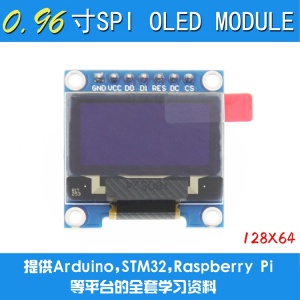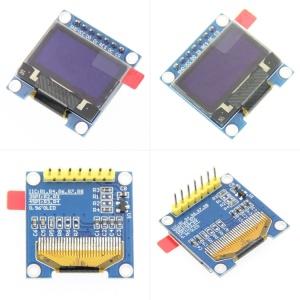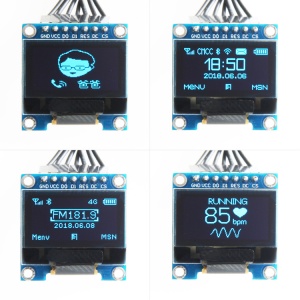More actions
No edit summary |
|||
| (11 intermediate revisions by the same user not shown) | |||
| Line 13: | Line 13: | ||
==<font color="blue">Product Description</font> == | ==<font color="blue">Product Description</font> == | ||
* | * 0.96 inch OLED screen with black and white, black or blue or yellow and blue color display | ||
* 128x64 resolution for clear display and high contrast | * 128x64 resolution for clear display and high contrast | ||
* Large viewing angle: greater than 160° (one screen with the largest viewing angle in the display) | * Large viewing angle: greater than 160° (one screen with the largest viewing angle in the display) | ||
* Wide voltage supply (3V~5V), compatible with 3.3V and 5V logic levels, no level shifting chip required | * Wide voltage supply (3V~5V), compatible with 3.3V and 5V logic levels, no level shifting chip required | ||
* | * The default is 4-wire SPI bus, which can choose 3-wire SPI bus or IIC bus | ||
* Ultra-low power consumption: normal display is only 0.06W (far below the TFT display) | * Ultra-low power consumption: normal display is only 0.06W (far below the TFT display) | ||
* Military-grade process standards, long-term stable work | * Military-grade process standards, long-term stable work | ||
| Line 29: | Line 29: | ||
|- | |- | ||
| align="center" |Display Color | | align="center" |Display Color | ||
| align="center" | | | align="center" |White, blue, yellow and blue | ||
|- | |- | ||
| align="center" |SKU | | align="center" |SKU | ||
| align="center" | | | align="center" |MSP096B | ||
MSP096W | |||
MSP096Y | |||
|- | |- | ||
| align="center" |Screen Size | | align="center" |Screen Size | ||
| align="center" | | | align="center" |0.96(inch) | ||
|- | |- | ||
| align="center" |Screen Type | | align="center" |Screen Type | ||
| Line 41: | Line 44: | ||
|- | |- | ||
| align="center" |Driver IC | | align="center" |Driver IC | ||
| align="center" | | | align="center" |SSD1306 | ||
|- | |- | ||
| align="center" |Resolution | | align="center" |Resolution | ||
| Line 47: | Line 50: | ||
|- | |- | ||
| align="center" |Module Interface | | align="center" |Module Interface | ||
| align="center" | | | align="center" |3-line、4-line SPI、IIC interface | ||
|- | |- | ||
| align="center" |Active Area | | align="center" |Active Area | ||
| align="center" | | | align="center" |21.744x10.864 (mm) | ||
|- | |- | ||
| align="center" |Touch Screen Type | | align="center" |Touch Screen Type | ||
| Line 59: | Line 62: | ||
|- | |- | ||
| align="center" |Module PCB Size | | align="center" |Module PCB Size | ||
| align="center" | | | align="center" |27.3x27.8 (mm) | ||
|- | |- | ||
| align="center" |Visual Angle | | align="center" |Visual Angle | ||
| Line 77: | Line 80: | ||
|- | |- | ||
| align="center" |Rough Weight(Package containing) | | align="center" |Rough Weight(Package containing) | ||
| align="center" | | | align="center" |8(g) | ||
|} | |} | ||
| Line 83: | Line 86: | ||
{| class="FCK__ShowTableBorders" align="left" | {| class="FCK__ShowTableBorders" align="left" | ||
|- | |- | ||
![[file: | ![[file:MSP096X-001.png|无框|300px]] | ||
![[file: | ![[file:MSP096X-002.png|无框|300px]] | ||
|- | |- | ||
| align="center" | '''Picture 1. Module pin silk screen''' | | align="center" | '''Picture 1. Module pin silk screen''' | ||
| Line 92: | Line 95: | ||
'''NOTE:''' | '''NOTE:''' | ||
{| class="wikitable" border="1" style="width: | :1.This module supports IIC, 3-wire SPI and 4-wire SPI interface bus mode switching (shown in red box in Figure 2). The details are as follows: | ||
::A.Using 4.7K resistance to solder only '''R3''' and '''R4''' resistors, then choose '''4-wire SPI''' bus interface ('''default'''); | |||
::B.Using 4.7K resistance to solder only '''R2''' and '''R3''' resistors, then select '''3-wire SPI''' bus interface; | |||
::C.Using 4.7K resistance to solder only '''R1''', '''R4''', '''R6''', '''R7''', '''R8''' resistors, then select the '''IIC''' bus interface; | |||
:2.After the interface bus mode is switched, you need to select the corresponding software and the corresponding wiring pins (as shown in Figure 1) | |||
::for the module to operate normally. The corresponding wiring pins are described as follows: | |||
::A.select the '''4-wire SPI''' bus interface, '''all pins need to be used'''; | |||
::B.select the '''3-wire SPI''' bus interface, only the '''DC''' pin does not need to be used(it can not be connected), other pins need to be used; | |||
::C.select the '''IIC''' bus interface, only need to use the four pins '''GND''', '''VCC''', '''D0''', '''D1''', At the same time, the '''RES''' pin is connected to the | |||
:::high level (can be connected to the VCC), the '''DC''' and '''CS''' pins are connected to the power GND; | |||
{| class="wikitable" border="1" style="width: 700px; background-color: white;" | |||
| align="center" |Number | | align="center" |Number | ||
| align="center" |Module Pin | | align="center" |Module Pin | ||
| Line 104: | Line 113: | ||
|- | |- | ||
| align="center" |1 | | align="center" |1 | ||
| align="center" | | | align="center" |GND | ||
|OLED power ground | |||
|- | |- | ||
| align="center" |2 | | align="center" |2 | ||
| align="center" | | | align="center" |VCC | ||
|OLED power positive (3.3V~5V) | |||
|- | |- | ||
| align="center" |3 | | align="center" |3 | ||
| align="center" | | | align="center" |D0 | ||
|OLED SPI and IIC bus clock signals | |||
|- | |- | ||
| align="center" |4 | | align="center" |4 | ||
| align="center" | | | align="center" |D1 | ||
| align="center" |OLED IIC bus data signal | |OLED SPI and IIC bus data signals | ||
|- | |||
| align="center" |5 | |||
| align="center" |RES | |||
|OLED reset signal, low level reset | |||
(this pin need to connected to the high level (can be connected to the VCC) when selecting IIC bus) | |||
|- | |||
| align="center" |6 | |||
| align="center" |DC | |||
|OLED command / data input select signal, high level: data, low level: command | |||
(this pin is not required(it can not be connected) when selecting 3-wire SPI bus; this pin need to connected to the power GND when selecting IIC bus) | |||
|- | |||
| align="center" |7 | |||
| align="center" |CS | |||
|OLED chip select signal, low level enable | |||
(this pin need to connected to the power GND when selecting IIC bus) | |||
|- | |- | ||
|} | |} | ||
| Line 123: | Line 147: | ||
==<font color="blue">Product Documentation</font> == | ==<font color="blue">Product Documentation</font> == | ||
* [http://www.lcdwiki.com/res/ | * [http://www.lcdwiki.com/res/MSP096X/0.96inch_OLED_SPI_Module_MSP096X_User_Manual_EN.pdf '''0.96inch SPI_OLED Module User Manual'''] | ||
* [http://www.lcdwiki.com/res/ | * [http://www.lcdwiki.com/res/MSP096X/SPEC_LED096W_V1.0.pdf '''0.96inch OLED Specification(WHITE)'''] | ||
* [http://www.lcdwiki.com/zh/images/ | * [http://www.lcdwiki.com/res/MSP096X/SPEC_LED096B_V1.0.pdf '''0.96inch OLED Specification(BLUE)'''] | ||
* [http://www.lcdwiki.com/res/ | * [http://www.lcdwiki.com/res/MSP096X/SPEC_LED096Y_V1.0.pdf '''0.96inch OLED Specification(YELLOW and BLUE)'''] | ||
* [http://www.lcdwiki.com/res/ | * [http://www.lcdwiki.com/zh/images/1/14/0.96inch_OLED_SPI_Size.png '''0.96inch SPI_OLED Module Size Picture'''] | ||
* [http://www.lcdwiki.com/res/ | * [http://www.lcdwiki.com/res/MSP096X/0.96inch_OLED_SPI_schematic.pdf '''0.96inch SPI_OLED Module Schematic'''] | ||
* [http://www.lcdwiki.com/res/MSP096X/Altium_Package_library.zip '''0.96inch SPI_OLED Module OLED Schematic and PCB Package Library'''] | |||
* [http://www.lcdwiki.com/res/MSP096X/SSD1306-Revision-1.5.pdf '''Driver IC SSD1306 Datasheet'''] | |||
==<font color="blue">Program Download</font> == | ==<font color="blue">Program Download</font> == | ||
* [http://www.lcdwiki.com/res/Program/OLED/ | * [http://www.lcdwiki.com/res/Program/OLED/0.96inch/SPI_SSD1306_MSP096X_V1.0/0.96inch_SPI_OLED_Module_SSD1306_MSP096X_V1.0.zip '''0.96inch SPI_OLED Module Package'''] | ||
==<font color="blue">Reference Materials</font> == | ==<font color="blue">Reference Materials</font> == | ||
Latest revision as of 16:46, 21 October 2019
Product Picture
Product Description
- 0.96 inch OLED screen with black and white, black or blue or yellow and blue color display
- 128x64 resolution for clear display and high contrast
- Large viewing angle: greater than 160° (one screen with the largest viewing angle in the display)
- Wide voltage supply (3V~5V), compatible with 3.3V and 5V logic levels, no level shifting chip required
- The default is 4-wire SPI bus, which can choose 3-wire SPI bus or IIC bus
- Ultra-low power consumption: normal display is only 0.06W (far below the TFT display)
- Military-grade process standards, long-term stable work
- Provides a rich sample program for STM32, C51, Arduino, Raspberry Pi and MSP430 platforms
- Provide underlying driver technical support
Product Parameters
| Name | Parameter |
| Display Color | White, blue, yellow and blue |
| SKU | MSP096B
MSP096W MSP096Y |
| Screen Size | 0.96(inch) |
| Screen Type | OLED |
| Driver IC | SSD1306 |
| Resolution | 128*64 (Pixel) |
| Module Interface | 3-line、4-line SPI、IIC interface |
| Active Area | 21.744x10.864 (mm) |
| Touch Screen Type | have no touch screen |
| Touch IC | have no IC |
| Module PCB Size | 27.3x27.8 (mm) |
| Visual Angle | >160° |
| Operating Temperature | -20℃~60℃ |
| Storage Temperature | -30℃~70℃ |
| Operating Voltage | 3.3V~5V |
| Power Consumption | TBD |
| Rough Weight(Package containing) | 8(g) |
Interface Definition
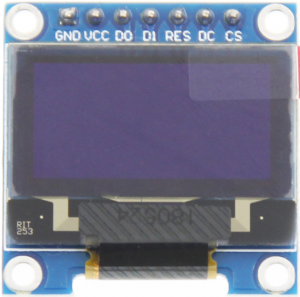
|
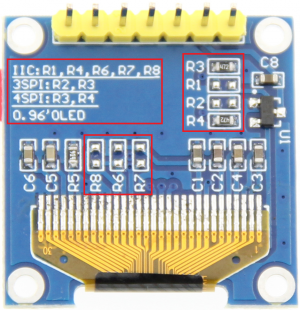
|
|---|---|
| Picture 1. Module pin silk screen | Picture 2. Rear view of the module |
NOTE:
- 1.This module supports IIC, 3-wire SPI and 4-wire SPI interface bus mode switching (shown in red box in Figure 2). The details are as follows:
- A.Using 4.7K resistance to solder only R3 and R4 resistors, then choose 4-wire SPI bus interface (default);
- B.Using 4.7K resistance to solder only R2 and R3 resistors, then select 3-wire SPI bus interface;
- C.Using 4.7K resistance to solder only R1, R4, R6, R7, R8 resistors, then select the IIC bus interface;
- 2.After the interface bus mode is switched, you need to select the corresponding software and the corresponding wiring pins (as shown in Figure 1)
- for the module to operate normally. The corresponding wiring pins are described as follows:
- A.select the 4-wire SPI bus interface, all pins need to be used;
- B.select the 3-wire SPI bus interface, only the DC pin does not need to be used(it can not be connected), other pins need to be used;
- C.select the IIC bus interface, only need to use the four pins GND, VCC, D0, D1, At the same time, the RES pin is connected to the
- high level (can be connected to the VCC), the DC and CS pins are connected to the power GND;
| Number | Module Pin | Pin description |
| 1 | GND | OLED power ground |
| 2 | VCC | OLED power positive (3.3V~5V) |
| 3 | D0 | OLED SPI and IIC bus clock signals |
| 4 | D1 | OLED SPI and IIC bus data signals |
| 5 | RES | OLED reset signal, low level reset
(this pin need to connected to the high level (can be connected to the VCC) when selecting IIC bus) |
| 6 | DC | OLED command / data input select signal, high level: data, low level: command
(this pin is not required(it can not be connected) when selecting 3-wire SPI bus; this pin need to connected to the power GND when selecting IIC bus) |
| 7 | CS | OLED chip select signal, low level enable
(this pin need to connected to the power GND when selecting IIC bus) |
Product Documentation
- 0.96inch SPI_OLED Module User Manual
- 0.96inch OLED Specification(WHITE)
- 0.96inch OLED Specification(BLUE)
- 0.96inch OLED Specification(YELLOW and BLUE)
- 0.96inch SPI_OLED Module Size Picture
- 0.96inch SPI_OLED Module Schematic
- 0.96inch SPI_OLED Module OLED Schematic and PCB Package Library
- Driver IC SSD1306 Datasheet
Program Download
Reference Materials
- Arduino IDE software use illustration
- RaspberryPi GPIO library installation instructions
- Python Image Library installation instructions
- C51 Keil and stc-isp software use illustration
- STM32 keil software use illustration
- IAR_IDE and MspFet software use illustration
- PCtoLCD2002 software use illustration
- Image2Lcd software use illustration
- Chinese and English display modulo settings

